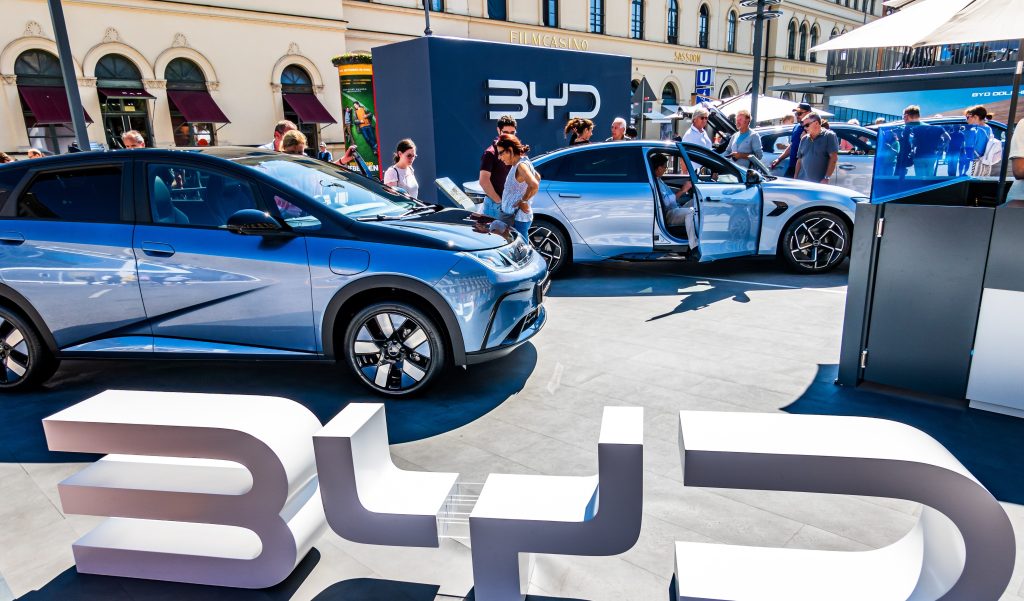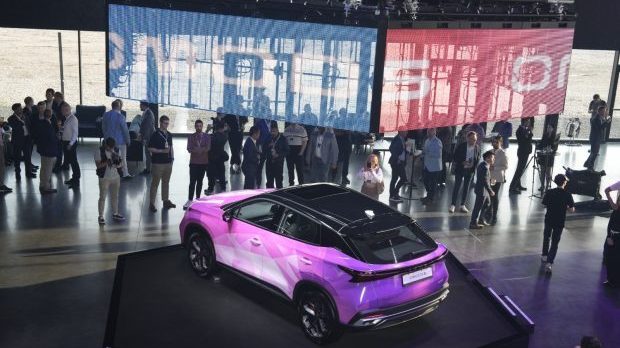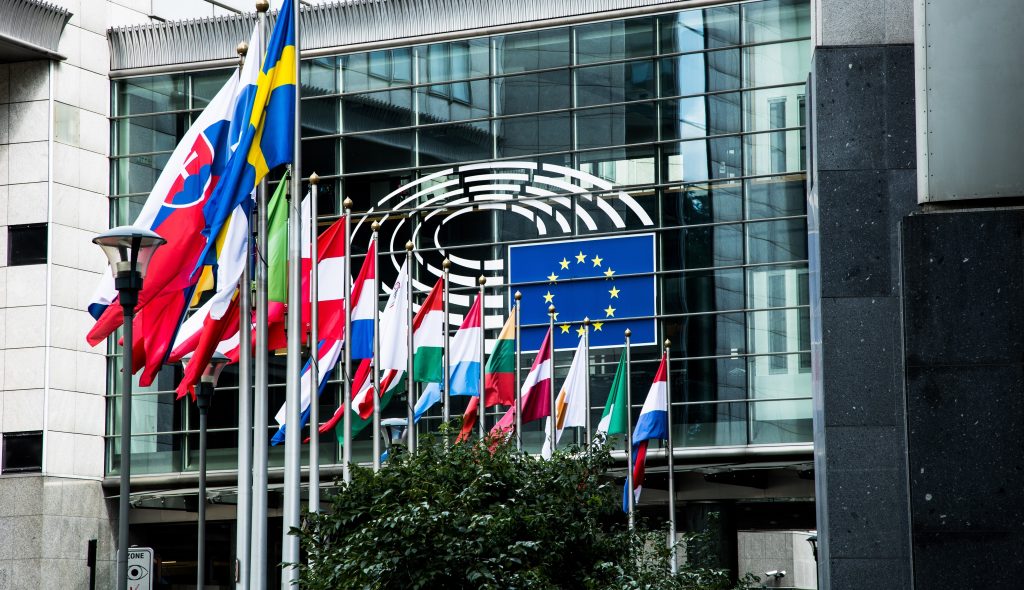
By Guy Bird
After reports of an onslaught of UK newcomer brands from 2023, Chinese marques are still arriving and expanding but there are crosswinds. Clarification from the Government on tariff hikes for Chinese-made electric vehicles should come soon
Last year, hardly a month passed by without news of some new brand – mainly with Chinese background or backing – poised to land in the UK and upset the traditional carmakers’ applecart. Credible technology – especially in EVs, PHEVs and hybrids – plus ‘good-enough’ design appeal and crucially, very keen pricing, seemed to be turning customer and dealer heads alike.
A great example is Chinese maker BYD, which has been busy building its dreams since 1995 as a battery-specialist-turned carmaker, to the point of selling 1.86m units globally in 2022 and trumping Tesla in the process. It entered the UK market in March 2023 and by the end of that year had shifted more than three million units worldwide (3,024,417), retained its position as China’s best-selling brand and crept into the world’s top ten carmaker list.
By the end of 2023, BYD had only registered 1161 cars in the UK but in the first eight months of 2024 (January-August) shifted 4110. UK dealer expansion is now rapid. In mid-2023 there were just a few Stratstone and Arnold Clark sites selling BYD cars, but at the time of writing, there are 41 UK-based BYD stores open, with that total set to rise to 60 outlets by the end of 2024. Four models are currently on sale, from the small Dolphin hatchback EV with a 265-mile range – a bit larger than a MG4 and slightly smaller than the Kia EV3 – to the all-new Seal U DM-I plug-in hybrid family SUV just launched with up to 50 miles electric-only range, 44mpg and a large central infotainment screen rotatable from ‘portrait’ to ‘landscape’ and back (as previewed in the brand’s Atto crossover).
BYD also boasts a USP in developing its own drive motors, semiconductors and batteries using lithium-iron phosphate as opposed to the industry-standard lithium-ion, which it says is more stable, durable and safe. BYD is positioned as a mainstream brand, with prices starting from £26,195 for the Dolphin, but it already has a premium-to-luxury marque called YangWang on sale in China too. The designers of its flagship large electric SUV have aspirations to make Bentley-style interiors and its engineers are already able to allow the huge 4×4 to make high-tech ‘tank-turns’ just like the new Mercedes G-Wagen EV. Debuting at the 2024 Goodwood Festival of Speed, YangWang could easily follow BYD to the UK, although nothing has been confirmed as yet.
 Omoda is a less established Chinese brand and name, but one which finally landed on UK shores this year. Its parent company Chery will be familiar to seasoned China auto industry watchers though. It’s been around for almost as long as BYD, founded back in 1997, claims to be China’s largest vehicle exporter for more than two decades and has had a joint venture with JLR for many years. The Omoda brand has a pair of Nissan Qashqai-sized crossovers just launched in the UK in August 2024, one petrol and one electric. The 186hp 1.6-litre turbo petrol Omoda 5 starts from £25,235, offering 31.4mpg and a 170 g/km CO2 rating, while the all-electric 204hp Omoda E5 model begins at £33,055, is more than half a second quicker from 0-62mph (7.2 seconds vs. 7.9 for the petrol) and provides a 257-mile range. Early reviews suggest neither will set the world alight in terms of ride and handling, but prices are keen.
Omoda is a less established Chinese brand and name, but one which finally landed on UK shores this year. Its parent company Chery will be familiar to seasoned China auto industry watchers though. It’s been around for almost as long as BYD, founded back in 1997, claims to be China’s largest vehicle exporter for more than two decades and has had a joint venture with JLR for many years. The Omoda brand has a pair of Nissan Qashqai-sized crossovers just launched in the UK in August 2024, one petrol and one electric. The 186hp 1.6-litre turbo petrol Omoda 5 starts from £25,235, offering 31.4mpg and a 170 g/km CO2 rating, while the all-electric 204hp Omoda E5 model begins at £33,055, is more than half a second quicker from 0-62mph (7.2 seconds vs. 7.9 for the petrol) and provides a 257-mile range. Early reviews suggest neither will set the world alight in terms of ride and handling, but prices are keen.
Like BYD, Chery also has a premium off-roader brand waiting in the wings, called Jaecoo – a fusion of the German word ‘Jäger’, meaning ‘hunter’ and the English word ‘cool’ in case you were wondering – which will follow its more value-led sibling brand to the UK. Currently there are 50 dual-branded Omoda & Jaecoo dealers in the UK including Endeavour Automotive, Listers, Peter Vardy, Arnold Clark, Cambria and Vospers and the aim is to have 100 sites in operation before the end of 2025. The plan is to sell 4000 cars in 2024 but to go much further and faster after that. “Our ultimate ambition is to achieve a 5% market share by 2034 with 100,000 sales, so similar to Kia,” says Victor Zhang, executive vice president, Omoda & Jaecoo UK. “But we aim to achieve this in a shorter time frame than they did. The UK will be a vital market in our global strategy.”
And other new Chinese brands are looking to join these pioneers, as China’s domestic market cools and more exports are sought to offset weakening local demand. This provides opportunities for UK dealers, but several economic and legislative crosswinds could derail those moves. Firstly, Chinese importers have outlined hugely ambitious plans to sell in the UK for many years, but most of those plans have not come to pass, been delayed or in some cases, brands have ceased trading globally completely – HiPhi and non-Chinese maker Fisker are just two very recent examples. So dealers should tread carefully and interrogate potential brands’ future plans thoroughly.

Secondly, recently introduced higher EU-style tariffs levied in the European Union on Chinese EV imports [see side box] might be copied by the new UK Government. This would increase prices for Chinese brands that lead on value more than other attributes and potentially see them become less desirable to cost-conscious consumers. However, given the toughness of the UK’s Zero Emission (ZEV) Mandate and slower demand for EVs, allowing low-price Chinese imports to the UK without imposing high tariffs could be a good way of incentivising EV uptake by British consumers and make those ZEV Mandate targets – starting with a 22% EV passenger car market share by this year’s end – more feasible, while staying in step with the Government’s broader environmental goals.
Clarification from the Government on tariff hikes for Chinese-made EVs and indeed any adjustment of the ZEV Mandate’s targets in light of current low demand for EVs in the UK should come soon, perhaps as soon as the October 30th Budget. Meanwhile, the Department of Transport PR responded to Motor Trader’s request for information with this guideline statement in late September: “We are committed to phasing out new cars that rely solely on internal combustion engines by 2030. We want to provide certainty and ensure consumers can benefit from more efficient vehicles as we take action to clean up our transport system. The Zero Emission Vehicle (ZEV) Mandate already requires 80% of all new cars to be ZEV by 2030. There will be no sales of new pure combustion engine cars from 2030 under our plans, and we will set out more details on specific 2030-35 requirements for both cars and vans shortly.”
Guy Bird is a long standing contributor to Motor Trader
 Motor Trader The award-winning and longest running UK magazine for car retailing professionals. Your first stop for News, Jobs and Reports for the motor industry.
Motor Trader The award-winning and longest running UK magazine for car retailing professionals. Your first stop for News, Jobs and Reports for the motor industry.